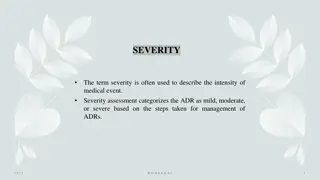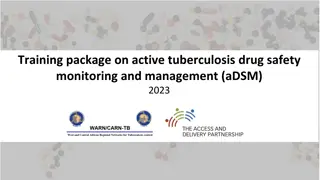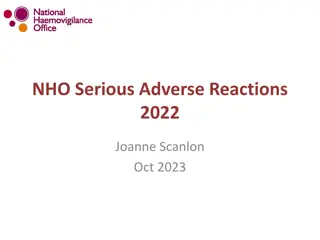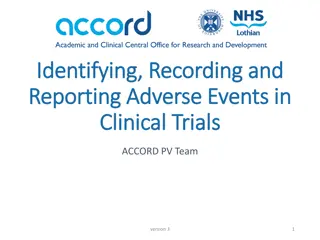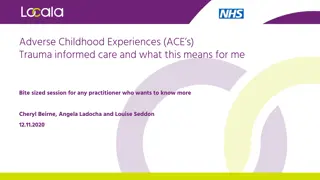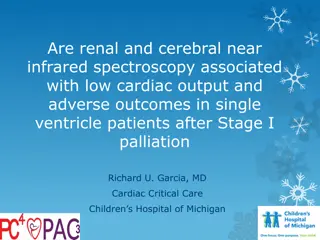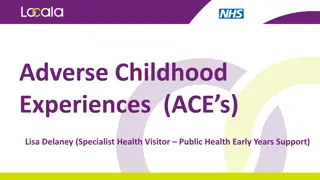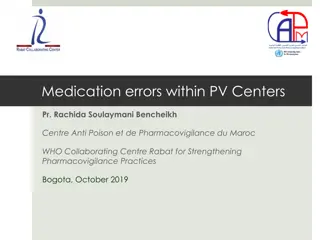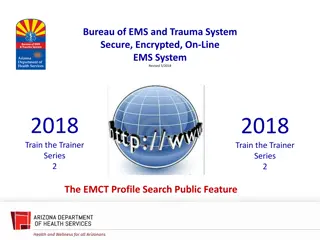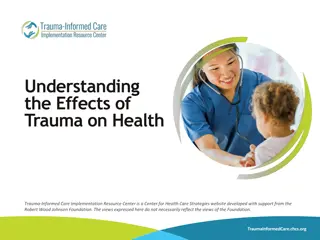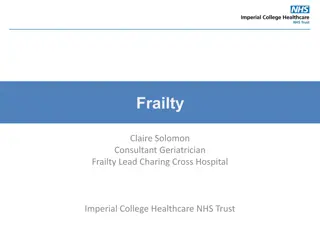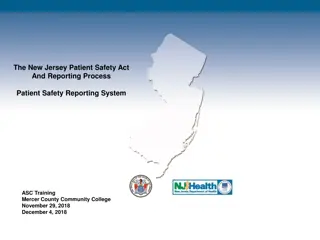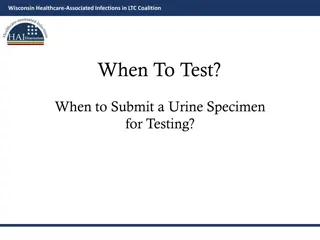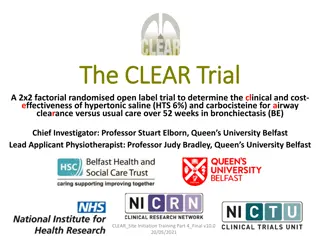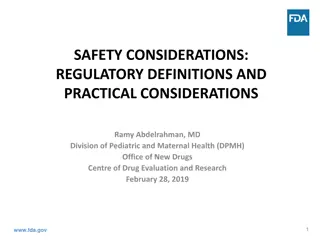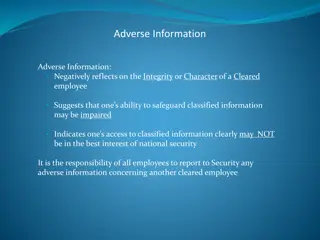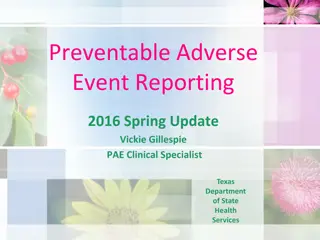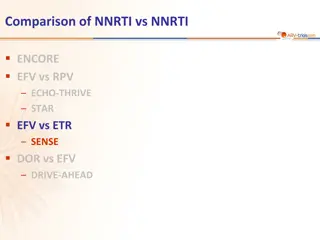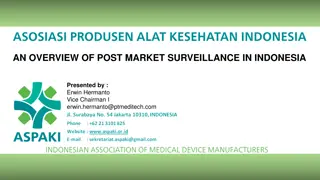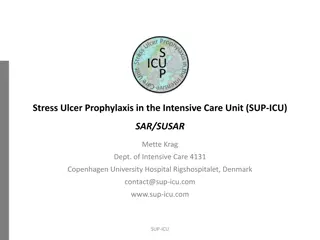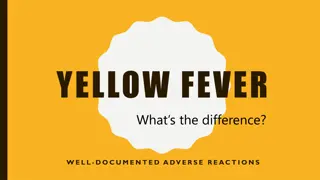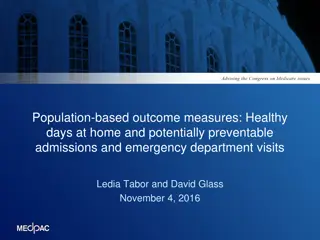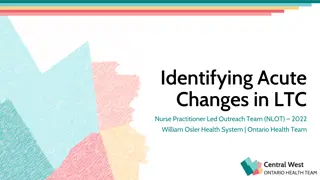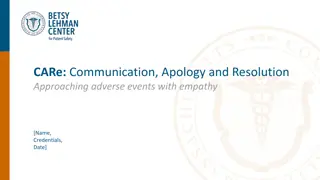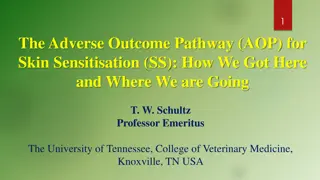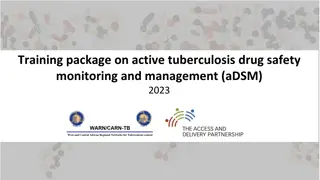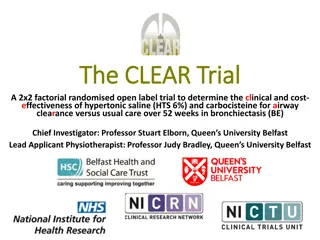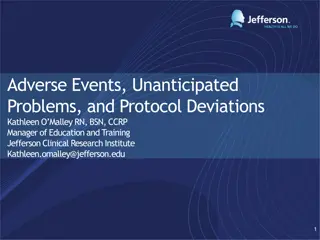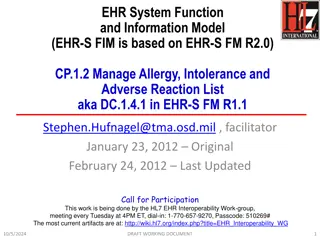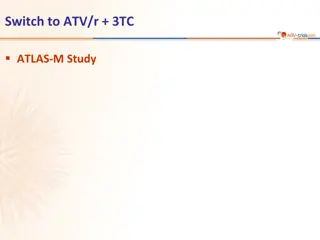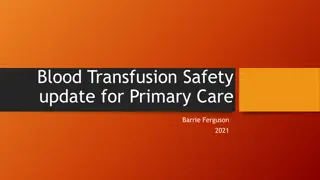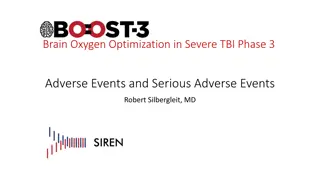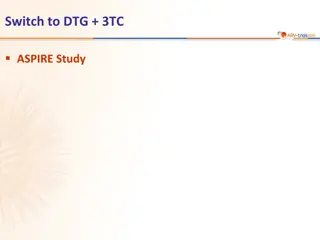Ticagrelor Monotherapy vs. 12-Month Dual Anti-Platelet Therapy After Coronary Stent Implantation for ACS
The study compares the efficacy of ticagrelor monotherapy after less than 1 month of dual anti-platelet therapy (DAPT) to 12-month ticagrelor-based DAPT in patients with acute coronary syndrome (ACS) undergoing percutaneous coronary intervention (PCI) with drug-eluting stent implantation. The aim is
1 views • 19 slides
Severity Assessment in Adverse Drug Reactions
The concept of severity assessment in adverse drug reactions (ADRs) categorizes the intensity of medical events into mild, moderate, severe, or lethal categories based on the required management steps. Various classification systems such as Karch and Lasagna, as well as modified Hartwig's and Siegel
4 views • 10 slides
Active Tuberculosis Drug Safety Monitoring and Management Training Package 2023
This training package focuses on the safety monitoring and management of active tuberculosis drugs, specifically emphasizing causality assessment in determining adverse reactions. Participants will learn about assessing the likelihood of TB medicines causing adverse events, attributing relationships
3 views • 17 slides
Overview of Serious Adverse Reactions and Transfusion Events
This data compilation covers the reporting trends, breakdown of reports, components issued, and specific types of adverse transfusion reactions experienced within the National Healthcare Organization (NHO) from 2019 to 2022. The information includes statistics on Serious Adverse Events (SAE), Seriou
2 views • 46 slides
Understanding Adverse Events Following Immunization (AEFI)
Adverse Events Following Immunization (AEFI) are medical incidents that occur after immunization, potentially caused by the vaccine, leading to unfavorable symptoms. Pharmacovigilance plays a crucial role in detecting, assessing, and preventing these events. AEFI can impact immunization programs at
2 views • 40 slides
NSFAS Annual Report 2021/22 - Adverse Audit Findings and Resolutions Update
Significant delays affected the compilation of NSFAS Annual Financial Statements for 2021/22, leading to an adverse audit opinion due to material misstatements and limitations in various financial areas. The report highlights issues with amounts owed, receivables, bursaries, cash flows, irregular ex
0 views • 38 slides
Understanding Adverse Events in Clinical Trials
This presentation covers the identification, recording, and reporting of adverse events in clinical trials conducted by University of Edinburgh and/or NHS Lothian. It includes definitions, examples of adverse event recording, SAE form completion, and common mistakes. AEs can range from minor issues
0 views • 35 slides
Understanding Adverse Childhood Experiences (ACEs): Impact and Implications for Practitioners
Delve into the world of Adverse Childhood Experiences (ACEs) and trauma-informed care through a bite-sized session aimed at practitioners. Learn about the various forms of ACEs, their impact on health and well-being, and the implications for those in caring and supportive roles. Discover how ACEs ar
1 views • 24 slides
Association of Renal and Cerebral Near-Infrared Spectroscopy with Adverse Outcomes in Single Ventricle Patients after Stage I Palliation
Study investigates the association between renal and cerebral near-infrared spectroscopy (NIRS) values and low cardiac output syndrome in single ventricle patients post Stage I palliation. Data from infants who underwent surgery between 2010-2019 is analyzed to determine correlations with adverse ou
1 views • 13 slides
Impact of Adverse Childhood Experiences (ACEs) on Individuals and Society
Adverse Childhood Experiences (ACEs) encompass a wide range of traumatic events during childhood that can have long-lasting effects on individuals. These experiences, such as abuse, neglect, and family issues, can significantly increase the risk of developing harmful behaviors and health conditions
1 views • 15 slides
Understanding Medication Errors in Pharmacovigilance Centers
Adverse drug reactions resulting from medication errors are a significant concern faced by pharmacovigilance centers. This content discusses the importance of this problem, contributing factors, the relevance to pharmacovigilance centers, and strategies for managing medication errors. It highlights
4 views • 29 slides
Bureau of EMS and Trauma System Secure Online EMS System Overview
The Bureau of EMS and Trauma System offers an online platform that allows the public to search for Emergency Medical Care Technicians (EMCT) by name or certification number. The system provides access to EMCT profiles, including information such as certification status, level, issuance and expiratio
2 views • 21 slides
Understanding the Effects of Trauma on Health: Insights from Trauma-Informed Care Implementation
Individual trauma and adverse childhood experiences can have lasting effects on mental, physical, social, and emotional well-being. The Trauma-Informed Care Implementation Resource Center provides valuable insights on defining trauma, examples of traumatic events, prevalence statistics, and types of
0 views • 11 slides
Understanding Frailty in Geriatric Care
Frailty in older adults is a clinical state of vulnerability with risks for adverse outcomes. It is distinct from old age or morbidity and requires careful identification due to its association with adverse events. Screening for frailty is crucial to target interventions effectively and improve pati
0 views • 23 slides
Understanding the New Jersey Patient Safety Act and Reporting Process
The New Jersey Patient Safety Act, enacted in April 2004, aims to enhance patient safety, minimize adverse events, and improve system/facility performance. It emphasizes confidentiality, promotes a blame-free culture, and encourages evidence-based practices. Healthcare facilities, including ASCs, ar
0 views • 71 slides
**Wisconsin Healthcare-Associated Infections in LTC Coalition: Urine Testing Guidelines**
The Wisconsin Healthcare-Associated Infections in LTC Coalition provides guidelines on when to test and submit urine specimens for testing in long-term care facilities. The focus is on reducing unnecessary urine testing, introducing tools like the UTI Stoplight Tool and the When To Test-Nursing Tool
5 views • 16 slides
Ensuring Safety in Research: Guidelines and Reporting
Safety in research is crucial for protecting participants. This content covers key definitions, safety reporting responsibilities, regulatory guidelines, adverse event monitoring, and definitions related to adverse events in clinical trials. Understanding these aspects is essential for safeguarding
0 views • 40 slides
The CLEAR Trial: Investigating Hypertonic Saline and Carbocisteine in Bronchiectasis
The CLEAR Trial is a 2x2 factorial randomized trial evaluating the effectiveness of hypertonic saline and carbocisteine for airway clearance in bronchiectasis over 52 weeks. Led by Professor Stuart Elborn and Professor Judy Bradley from Queen's University Belfast, the trial focuses on clinical and c
1 views • 23 slides
Safety Considerations and Regulatory Definitions in Drug Evaluation
This presentation by Ramy Abdelrahman, MD, delves into safety considerations, regulatory definitions, and practical responsibilities in drug evaluation. It covers adverse events, suspected adverse reactions, and reporting responsibilities for investigators and sponsors. The content emphasizes making
2 views • 18 slides
Understanding Adverse Information Reporting in National Security
This detailed content covers the importance of reporting adverse information regarding cleared employees in national security settings. It outlines the impact of adverse information on security clearances, the 13 adjudicative guidelines used in determining eligibility for sensitive duties, NISPOM re
0 views • 15 slides
Preventable Adverse Event Reporting 2016 Spring Update Summary
Annual Survey process, assessment of harm, reportable PAEs, differences between SREs and HACs, selected Tier 2 and 3 PAEs, 2015 PAE findings, case scenarios/FAQs, Report No. PAEs timeline, available resources on PAE website, upcoming training information, and contact details for questions and suppor
2 views • 59 slides
Understanding Disclosure of Adverse Clinical Events in Healthcare
Exploring the essential elements of disclosing adverse clinical events to patients and families in healthcare settings. It covers why disclosure is crucial, barriers to disclosure, triggers for disclosure, policies and procedures, and the other important aspects related to the disclosure process.
0 views • 8 slides
Comparison of NNRTI vs. NNRTI in SENSE Study
The comparison between Etravirine (ETR) and Efavirenz (EFV) in the SENSE Study showed differences in neuropsychiatric adverse events, treatment response, and patient characteristics. ETR with 2 NRTIs resulted in fewer drug-related adverse events than EFV with 2 NRTIs. ETR also showed better response
0 views • 7 slides
Post Market Surveillance Procedures in Indonesia
Post-market surveillance of medical devices in Indonesia is overseen by the Surveillance Directorate of Medical Device and Household Health Supplies. Manufacturers must adhere to ASEAN guidelines and report adverse events through online systems. The country has specific regulations and requirements
0 views • 10 slides
Stress Ulcer Prophylaxis in ICU - Adverse Reactions Reporting Guidelines
Guidelines for reporting adverse reactions in Stress Ulcer Prophylaxis in the Intensive Care Unit (SUP-ICU), including definitions of Adverse Reactions (AR), Serious Adverse Reactions (SAR), Adverse Events (AE), Serious Adverse Events (SAE), SARs in SUP-ICU, and SUSARs. Specific conditions considere
0 views • 8 slides
Fife Health and Wellbeing Workshop - Ambitions and Participants
The Fife Health and Wellbeing Workshop aims to address preventable ill health and promote high-quality outdoor and leisure opportunities for all communities. The workshop features a support team comprising policy leads, a chair, a communications lead, a community lead, and a facilitator. Key partici
0 views • 10 slides
Yellow Fever: Adverse Reactions and Risks
Yellow fever vaccination can lead to severe adverse reactions like anaphylaxis, neurotropic disease, and viscerotropic disease. These reactions can range from immediate hypersensitivity to rare but serious outcomes such as meningitis and multiple system organ failure. The mortality rate associated w
0 views • 11 slides
Population-based Outcome Measures: Healthy Days at Home and Preventable Admissions
The content discusses population-based outcome measures focusing on Healthy Days at Home (HDAH) and Potentially Preventable Admissions (PPA). It explores the direction for Medicare quality measurement, emphasizing the importance of these measures in evaluating healthcare quality. The concept, calcul
0 views • 18 slides
Enhancing Care for Long-Term Care Residents Through Early Detection and Intervention
This collection of resources highlights the importance of identifying acute changes in long-term care (LTC) residents, focusing on potentially preventable conditions such as chronic obstructive pulmonary disease, urinary tract infections, pneumonia, and heart failure. It underscores the risks associ
0 views • 25 slides
CARe Program: Enhancing Communication, Apology, and Resolution in Healthcare
The CARe program focuses on approaching adverse events in healthcare with empathy, emphasizing communication, apology, and resolution. It aims to improve patient outcomes, clinician-patient relationships, and overall healthcare system efficiency by addressing adverse events promptly and transparentl
0 views • 42 slides
Noise Control Measures and Community Preferences at the Corn Exchange
Various images and references discuss the history of amplified music events at the Corn Exchange, noise complaints leading to control methods by the FTC, impacts on events and community preferences post-control, and survey findings on participant demographics, noise effects, and desired public event
0 views • 19 slides
Understanding Skin Sensitisation through Adverse Outcome Pathways (AOP)
The Adverse Outcome Pathway (AOP) for Skin Sensitisation provides a mechanistic framework linking Molecular Initiating Events (MIE) to Adverse Outcomes (AO) through Key Events (KE) and Key Event Relationships (KER). AOPs offer a transparent justification for toxicological predictions and play a vita
0 views • 21 slides
Comprehensive Training Package on Active Tuberculosis Drug Safety Monitoring and Management (aDSM) 2023
This comprehensive training package focuses on active tuberculosis drug safety monitoring and management (aDSM) in 2023. It covers indicators, learning objectives, and essential information for implementing effective drug safety measures in tuberculosis treatment. The presentation emphasizes definin
0 views • 11 slides
Pharmacovigilance Guidelines for Clinical Trials in Bronchiectasis Research
The CLEAR Trial is a 2x2 factorial randomized trial evaluating the effectiveness of hypertonic saline and carbocisteine for airway clearance in bronchiectasis patients. The trial, led by Professor Stuart Elborn and Professor Judy Bradley, focuses on pharmacovigilance activities, adverse event defini
0 views • 20 slides
Understanding Adverse Events and Unanticipated Problems in Clinical Research
Explore the significance of adverse event reporting in clinical research, including definitions of adverse events (AEs) and serious adverse events (SAEs), as well as unanticipated problems (UAPs). Learn about the responsibilities of Investigators, Clinical Research Coordinators (CRCs), and Sponsors
0 views • 63 slides
EHR System Function and Information Model: Manage Allergy, Intolerance, and Adverse Reactions
This document outlines the function to manage patient-specific allergy, intolerance, and adverse reaction lists in an Electronic Health Record system. It covers capturing, maintaining, and viewing allergen information over time, including patient-reported events and provider-verified notations. The
0 views • 13 slides
Switch to ATV/r + 3TC: ATLAS-M Study
The ATLAS-M Study focused on switching to ATV/r + 3TC in participants with specific criteria, aiming to assess non-inferiority compared to ATV/r + 2 NRTIs. Results at W48 indicated a higher proportion free of treatment failure with ATV/r + 3TC, with notable differences in virologic failure rates and
0 views • 7 slides
Enhancing Blood Transfusion Safety in Primary Care: Key Updates for Healthcare Providers
Blood transfusion safety is a critical aspect of healthcare delivery, with the potential for preventable errors posing risks to patients. Initiatives like the Serious Hazards of Transfusion (SHOT) program and Patient Blood Management have played significant roles in improving safety and reducing adv
0 views • 25 slides
Brain Oxygen Optimization in Severe TBI: Adverse Events Analysis
This study led by Dr. Robert Silbergleit focuses on adverse events in brain oxygen optimization for severe Traumatic Brain Injury (TBI) patients. It outlines key points for reporting adverse events, discusses relatedness algorithms, and presents scenarios to analyze adverse events occurrence post-en
0 views • 24 slides
ASPIRE Study: Switch to DTG + 3TC Virologic Outcome at W24 and W48
The ASPIRE study evaluated the efficacy of switching to DTG + 3TC in HIV patients with stable triple ART regimens. The primary endpoint was treatment failure proportion at W24, with non-inferiority demonstrated at W48. Virologic outcomes, adverse events, and patient dispositions were reported, with
0 views • 4 slides

